The island of Cuba was inhabited by various Native American cultures prior to the arrival of the explorer Christopher Columbus in 1492. After his arrival, Spain conquered Cuba and appointed Spanish governors to rule in Havana. The administrators in Cuba were subject to the Viceroy of New Spain and the local authorities in Hispaniola. In 1762–63, Havana was briefly occupied by Britain, before being returned to Spain in exchange for Florida. A series of rebellions between 1868 and 1898, led by General Máximo Gómez, failed to end Spanish rule and claimed the lives of 49,000 Cuban guerrillas and 126,000 Spanish soldiers. However, the Spanish–American War resulted in a Spanish withdrawal from the island in 1898, and following three and a half years of subsequent US military rule, Cuba gained formal independence in 1902.
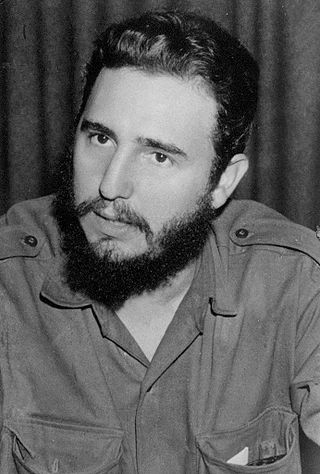
Fidel Alejandro Castro Ruz was a Cuban revolutionary and politician who was the leader of Cuba from 1959 to 2008, serving as the prime minister of Cuba from 1959 to 1976 and president from 1976 to 2008. Ideologically a Marxist–Leninist and Cuban nationalist, he also served as the first secretary of the Communist Party of Cuba from 1965 until 2011. Under his administration, Cuba became a one-party communist state; industry and business were nationalized, and socialist reforms were implemented throughout society.
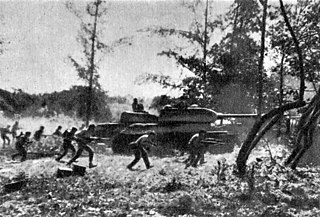
The Bay of Pigs Invasion was a failed military landing operation on the southwestern coast of Cuba in 1961 by the United States of America and the Cuban Democratic Revolutionary Front (DRF), consisting of Cuban exiles who opposed Fidel Castro's Cuban Revolution, clandestinely financed and directed by the U.S. government. The operation took place at the height of the Cold War, and its failure influenced relations between Cuba, the United States, and the Soviet Union.

The Cuban Revolution was the military and political effort to overthrow Fulgencio Batista's dictatorship which reigned as the government of Cuba between 1952 and 1959. It began after the 1952 Cuban coup d'état which saw former president and military general, Fulgencio Batista topple the nascent Cuban democracy and consolidate power. Among those opposing the coup was Fidel Castro, then a novice attorney who attempted to contest the coup through Cuba's judiciary. Once these efforts proved fruitless, Fidel Castro and his brother Raúl led an armed attack on the Cuban military's Moncada Barracks on 26 July 1953. Following the attack's failure, Fidel Castro and his co-conspirators were arrested and formed the 26th of July Movement (M-26-7) in detention. At his trial, Fidel Castro launched into a two hour speech that won him national fame as he laid out his grievances against the Batista dictatorship. In an attempt to win public approval, Batista granted amnesty to the surviving Moncada Barracks attackers and the Castros fled into exile. During their exile, the Castros consolidated their strategy in Mexico and subsequently reentered Cuba in 1956, accompanied by Che Guevara, whom they had encountered during their time in Mexico.
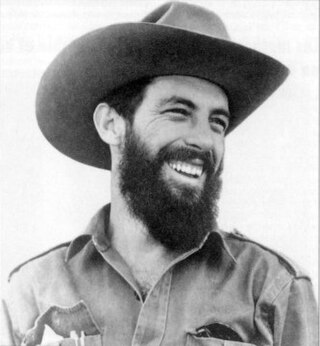
Camilo Cienfuegos Gorriarán was a Cuban revolutionary. One of the major figures of the Cuban Revolution, he was considered second only to Fidel Castro among the revolutionary leadership.
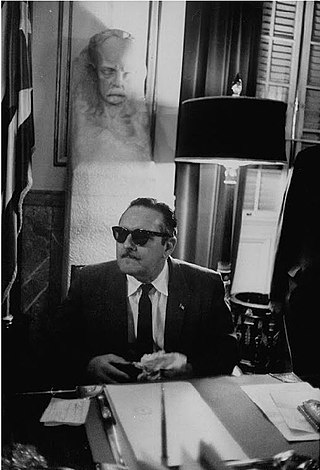
Manuel Urrutia Lleó was a liberal Cuban lawyer and politician. He campaigned against the Gerardo Machado government and the dictatorial second presidency of Fulgencio Batista during the 1950s, before serving as president in the revolutionary government of 1959. Urrutia resigned his position after only seven months, owing to a series of disputes with revolutionary leader Fidel Castro, and emigrated to the United States shortly afterward.
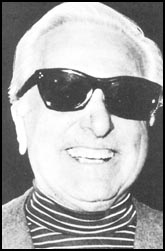
John"Handsome Johnny"Roselli, sometimes spelled Rosselli, was a mobster for the Chicago Outfit who helped that organization exert influence over Hollywood and the Las Vegas Strip. Roselli was recruited by the Central Intelligence Agency (CIA) in a plot to assassinate Cuban leader Fidel Castro.
History Will Absolve Me is the title of a two-hour speech made by Fidel Castro on 16 October 1953. Castro made the speech in his own defense in court against the charges brought against him after he led an attack on the Moncada Barracks in Cuba. The speech later became the manifesto of his 26th of July Movement.
Herbert Lionel Matthews was a reporter and editorialist for The New York Times who, at the age of 57, won widespread attention after revealing that the 30-year-old Fidel Castro was still alive and living in the Sierra Maestra mountains. President Fulgencio Batista claimed publicly that the young guerrilla leader had been killed during the landing of the yacht Granma, bringing him and others back to Cuba from Mexico in December 1956.
Ángel María Bautista Castro y Argiz was a Spanish-born Cuban farmer and businessman who was the father of Cuban leaders Fidel, Raúl and Ramón Castro.
Sir Arthur Leycester Scott Coltman, known as Leycester Coltman, was the British ambassador to Cuba from 1991 to 1994.

Vilma Lucila Espín Guillois was a Cuban revolutionary, feminist, and chemical engineer. She helped supply and organize the 26th of July Movement as an underground spy, and took an active role in many branches of the Cuban government from the conclusion of the revolution to her death. Espín helped found the Federation of Cuban Women and promoted equal rights for Cuban women in all spheres of life.

Fidel Castro proclaimed himself to be "a socialist, and Marxist–Leninist". As a Marxist–Leninist, Castro believed strongly in converting Cuba, and the wider world, from a capitalist system in which individuals own the means of production into a socialist system in which the means of production are owned by the workers. In the former, there is a class divide between the wealthy classes who control the means of production and the poorer working classes who labor on them, whilst in the latter, there is a decreasing class divide as the government redistributes the means of production leading to communism. Castro used Leninist thought as a model upon which to convert the Cuban state and society into a socialist form.
Rafael García Bárcena was a Cuban philosopher who later took a leading role in the Cuban Revolution against President Fulgencio Batista. A professor of philosophy, he founded the National Revolutionary Movement. Consisting largely of middle-class members, it contrasted with Fidel Castro's predominantly working class support base, the 26th of July Movement. In March 1953, the MNR had planned to attack and seize control of the barracks at Camp Colombia, but police had been alerted to the plot, with the conspirators being rounded up and tortured. In all, fourteen people were sentenced to imprisonment for the attack plot.
Alexander Ivanovich Alexeyev was a Soviet intelligence agent who posed first as a journalist and later a diplomat. His arrival in Havana on 1 October 1959 inaugurated a new era in Cuba–Soviet Union relations. Alexeyev was later appointed as the Soviet Ambassador to Cuba, and played a vital role in easing tensions during the Cuban Missile Crisis.
The early life of Cuban dictator and politician Fidel Castro spans the first 26 years of his life, from 1926 to 1952. Born in Birán, Oriente Province, Castro was the illegitimate son of Ángel Castro y Argiz, a wealthy farmer and landowner, and his mistress Lina Ruz González. First educated by a tutor in Santiago de Cuba, Fidel Castro then attended two boarding schools before being sent to El Colegio de Belén, a school run by Jesuits in Havana. In 1945 he began studying law at the University of Havana, where he first became politically conscious, becoming a staunch anti-imperialist and critic of United States involvement in the Caribbean. Involved in student politics, he was affiliated to Eduardo Chibás and his Partido Ortodoxo, achieving publicity as a vocal critic of the pro-U.S. administration of President Ramón Grau and his Partido Auténtico.
The Cuban communist revolutionary and politician Fidel Castro took part in the Cuban Revolution from 1953 to 1959. Following on from his early life, Castro decided to fight for the overthrow of Fulgencio Batista's military junta by founding a paramilitary organization, "The Movement". In July 1953, they launched a failed attack on the Moncada Barracks, during which many militants were killed and Castro was arrested. Placed on trial, he defended his actions and provided his famous "History Will Absolve Me" speech, before being sentenced to 15 years' imprisonment in the Model Prison on the Isla de Pinos. Renaming his group the "26th of July Movement" (MR-26-7), Castro was pardoned by Batista's government in May 1955, claiming they no longer considered him a political threat while offering to give him a place in the government, but he refused. Restructuring the MR-26-7, he fled to Mexico with his brother Raúl Castro, where he met with Argentine Marxist-Leninist Che Guevara, and together they put together a small revolutionary force intent on overthrowing Batista.
The political career of Fidel Castro saw Cuba undergo significant economic, political, and social changes. In the Cuban Revolution, Fidel Castro and an associated group of revolutionaries toppled the ruling government of Fulgencio Batista, forcing Batista out of power on 1 January 1959. Castro, who had already been an important figure in Cuban society, went on to serve as Prime Minister from 1959 to 1976. He was also the First Secretary of the Communist Party of Cuba, the most senior position in the communist state, from 1961 to 2011. In 1976, Castro officially became President of the Council of State and President of the Council of Ministers. He retained the title until 2008, when the presidency was transferred to his brother, Raúl Castro. Fidel Castro remained the first secretary of the Communist Party until 2011.

Former First Secretary of the Communist Party of Cuba and President of the Council of State, Fidel Castro died of natural causes at 22:29 (CST) on the evening of 25 November 2016, at the age of 90. His brother, the then-President of the State Council and then-First Secretary Raúl Castro, made an announcement about his death on state television. One of the most controversial political leaders of his era, Castro both inspired and dismayed people across the world during his lifetime. The London Observer stated that he proved to be "as divisive in death as he was in life", and that the only thing that his "enemies and admirers" agreed upon was that he was "a towering figure" in world affairs who "transformed a small Caribbean island into a major force in world affairs". The Daily Telegraph noted that across the world he was "either praised as a brave champion of the people, or derided as a power-mad dictator." Castro's body was cremated and his ashes were interred in Santiago de Cuba on 4 December 2016, and hundreds of thousands of Cubans commemorated the event.
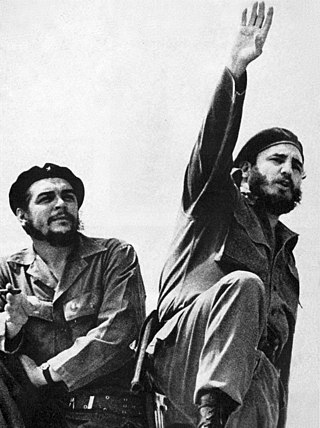
The consolidation of the Cuban Revolution is a period in Cuban history typically defined as starting in the aftermath of the revolution in 1959 and ending in the first congress of the Communist Party of Cuba 1975, which signified the final political solidification of the Cuban revolutionaries' new government. The period encompasses early domestic reforms, human rights violations continuing under the new regime, growing international tensions, and politically climaxed with the failure of the 1970 sugar harvest.










